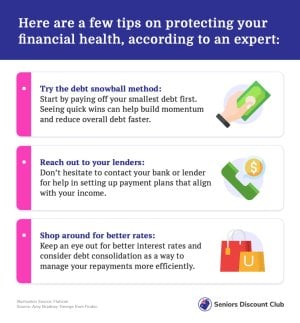Australians hit $70 billion in personal debt: How the cost of living crisis could affect you
- Replies 16
Are you feeling the squeeze of the ever-increasing cost of living in today's economy? You're not alone in this struggle. In fact, there are millions of Australians who are facing a tough financial situation right now.
A recent report has brought to light the staggering fact that Australians collectively owe over $70 billion in personal debts. This shocking revelation stems from a nationwide poll that shows how the rising cost of living has led to a significant surge in personal debt levels among Australians.
To cope with the inflation-driven price hikes in household bills, as well as the rising costs of food and other consumer goods, millions have resorted to loans and credit cards over the past year.

According to research by the popular finance comparison website Finder, the average Australian carries $20,238 in debt, spread across consumer loans and credit cards—an 11 per cent increase from just a year earlier when it was $18,301.
With the inflation rate now at 7 per cent, Australians are feeling the pressure of increased living costs. Finder's data shows that approximately 54 per cent of Australian adults (10.9 million people) had at least one credit card as of last month.
As a result, credit card debts have risen to a whopping $18.6 billion, personal loans have increased to $19.6 billion, and car loans are now worth an estimated $32.3 billion.
In times when Aussies find it increasingly difficult to manage their finances, measures need to be taken to protect their financial health. Finder's Personal Finance Expert, Amy Bradney-George, suggests seeking help managing your debt and making wise decisions to alleviate stress.
The so-called debt snowball method is one approach Bradney-George recommends, which entails paying off the smallest debt first to encourage momentum in clearing debts. She also advises contacting lenders to explore setting up payment plans that fit with income levels. After all, taking control of debt is essential to avoid further complications, especially when it comes to making sure there's food on the table.
With the rising cost of living, mounting personal debts, and increasing mortgage repayments, many Aussies are facing difficult financial times. Unfortunately, expenses such as health insurance premiums, HELP debts, and energy bills for some households and small businesses are on the rise, creating even more financial pressure.
Electricity prices for certain households and small businesses in NSW, South Australia, and southeast Queensland are expected to increase by up to 25 per cent from July 1.
Thankfully, the government has announced relief measures for power bills to ease the burden on families and small businesses—a helpful initiative during these challenging times.

It's important to stay alert and take proactive steps to handle our expenses, debts, and budgets. Don't hesitate to seek help when necessary, and be on the lookout for chances to cut costs. Remember, even the tiniest savings today will pave the way for a cosier and more secure tomorrow.
Do you have any other money-saving tips and advice? Share them in the comments below! We're eager to hear from you!
A recent report has brought to light the staggering fact that Australians collectively owe over $70 billion in personal debts. This shocking revelation stems from a nationwide poll that shows how the rising cost of living has led to a significant surge in personal debt levels among Australians.
To cope with the inflation-driven price hikes in household bills, as well as the rising costs of food and other consumer goods, millions have resorted to loans and credit cards over the past year.

More and more Aussies are relying on loans and credit cards as the cost of living soars. Credit: Pexels/Mikhail Nilov.
According to research by the popular finance comparison website Finder, the average Australian carries $20,238 in debt, spread across consumer loans and credit cards—an 11 per cent increase from just a year earlier when it was $18,301.
With the inflation rate now at 7 per cent, Australians are feeling the pressure of increased living costs. Finder's data shows that approximately 54 per cent of Australian adults (10.9 million people) had at least one credit card as of last month.
As a result, credit card debts have risen to a whopping $18.6 billion, personal loans have increased to $19.6 billion, and car loans are now worth an estimated $32.3 billion.
In times when Aussies find it increasingly difficult to manage their finances, measures need to be taken to protect their financial health. Finder's Personal Finance Expert, Amy Bradney-George, suggests seeking help managing your debt and making wise decisions to alleviate stress.
The so-called debt snowball method is one approach Bradney-George recommends, which entails paying off the smallest debt first to encourage momentum in clearing debts. She also advises contacting lenders to explore setting up payment plans that fit with income levels. After all, taking control of debt is essential to avoid further complications, especially when it comes to making sure there's food on the table.
With the rising cost of living, mounting personal debts, and increasing mortgage repayments, many Aussies are facing difficult financial times. Unfortunately, expenses such as health insurance premiums, HELP debts, and energy bills for some households and small businesses are on the rise, creating even more financial pressure.
Electricity prices for certain households and small businesses in NSW, South Australia, and southeast Queensland are expected to increase by up to 25 per cent from July 1.
Thankfully, the government has announced relief measures for power bills to ease the burden on families and small businesses—a helpful initiative during these challenging times.
Key Takeaways
- Australia's cost of living crisis has led to an explosion in personal debt levels, reaching a combined total of $70 billion.
- Research by the finance comparison website Finder reveals the average Australian now has $20,238 in debts spread across consumer loans and credit cards.
- Approximately 54 per cent of the adult population used a credit card last month, and one-in-seven people have a personal or car loan.
It's important to stay alert and take proactive steps to handle our expenses, debts, and budgets. Don't hesitate to seek help when necessary, and be on the lookout for chances to cut costs. Remember, even the tiniest savings today will pave the way for a cosier and more secure tomorrow.
Do you have any other money-saving tips and advice? Share them in the comments below! We're eager to hear from you!








